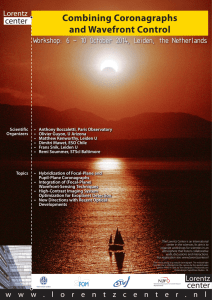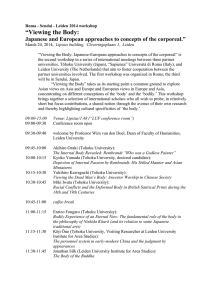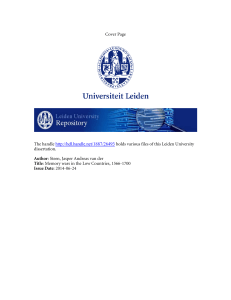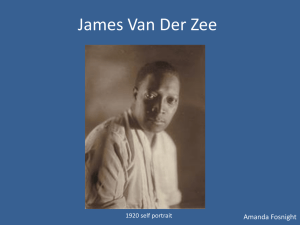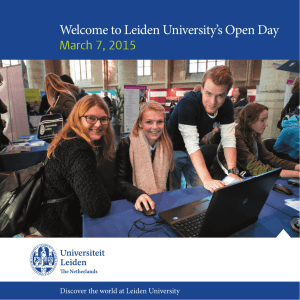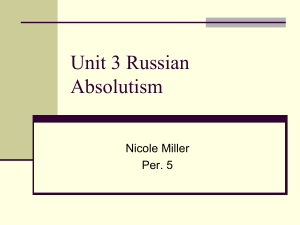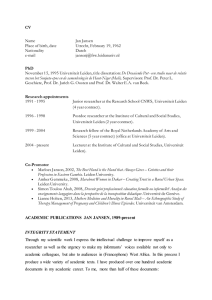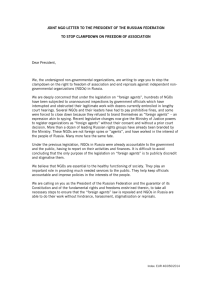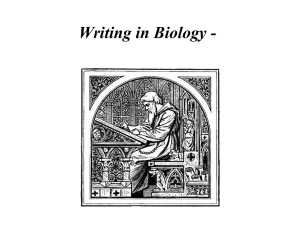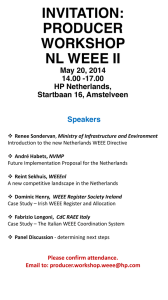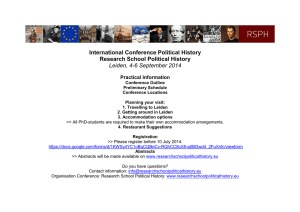Addendum List o lum Vitae_Acknowledgements
advertisement
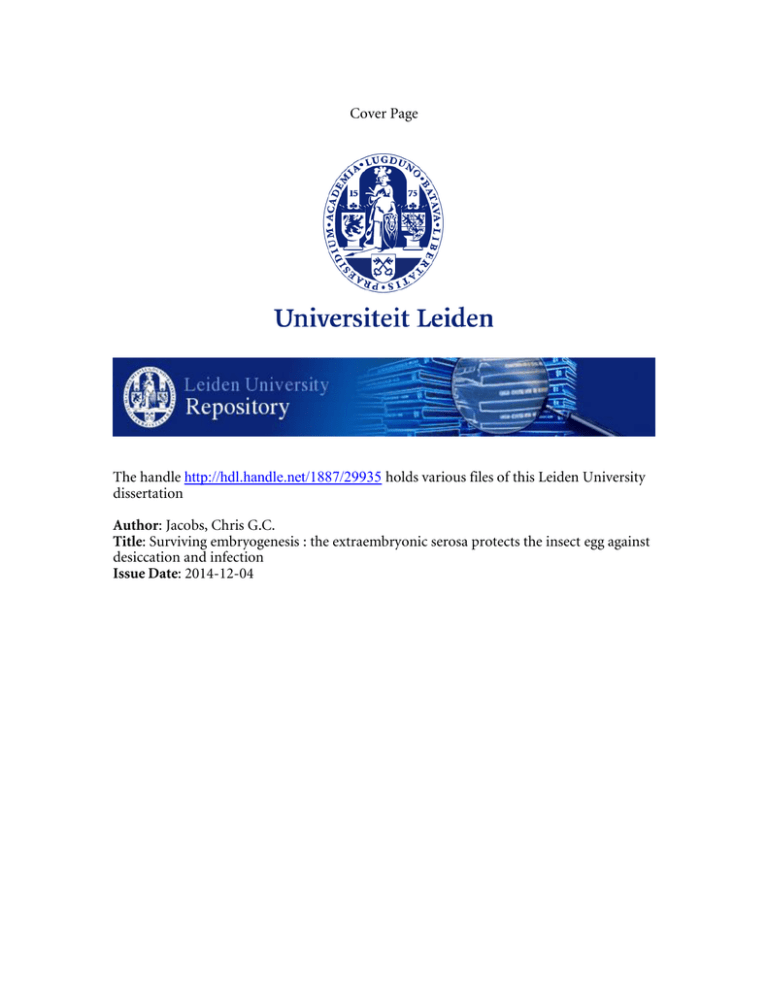
Cover Page The handle http://hdl.handle.net/1887/29935 holds various files of this Leiden University dissertation Author: Jacobs, Chris G.C. Title: Surviving embryogenesis : the extraembryonic serosa protects the insect egg against desiccation and infection Issue Date: 2014-12-04 Addendum List of Publications 1. 2. 3. 4. 5. 6. - - Jacobs, C.G.C., Spaink, H.P., van der Zee, M. (Accepted). The extraembryonic serosa is a frontier epithelium providing the insect egg with a full-range innate immune response. eLife Jacobs, C.G.C.*, Wang, Y.*, Vogel, H., Vilcinskas, A., van der Zee, M., Rozen, D.E. (2014). Egg survival is reduced by grave-soil microbes in the carrion beetle, Nicrophorus vespilloides. BMC evolutionary biology. 14 (1), 208-215. doi: 10.1186/s12862-014-0208-x Lee-Yaw, J.A., Jacobs, C.G.C., Irwin, D.E., (2014). Individual performance in relation to cytonuclear discordance in a northern contact zone between long-toed salamander (Ambystoma macrodactylum) lineages. Molecular Ecology. 23(18), 4590-4602. doi: 10.1111/mec.12878 Jacobs, C.G.C., van Overveld, T., Careau, V., Matthysen, E., Adriaensen, F., Slabbekoorn, H. (2014). Personality-dependent response to field playback in great tits: slow explorers can be strong responders. Animal Behaviour, 90, 65-71. http://dx.doi.org/10.1016/j.anbehav.2014.01.016 Jacobs, C.G.C. and van der Zee, M. (2013). Immune competence in insect eggs depends on the extraembryonic serosa. Developmental and Comparative Immunology, 41, 263-269. http://dx.doi.org/10.1016/j.dci.2013.05.017 Jacobs, C.G.C., Rezende, G.L., Lamers, G.E.M. and van der Zee, M. (2013). The extraembryonic serosa protects the insect egg against desiccation. Proceedings of the Royal Society B: Biological Sciences, 280(1764). http://dx.doi.org/10.1098/rspb.2013.1082 Van der Zee M, Benton M.A., Jacobs C.G.C., Vazquez Faci, T. and Rabouille C. (In review). The gap junction protein Innexin7a is essential for basal cell closure during cellularization of the Tribolium castaneum blastoderm. Jacobs, C.G.C., Braak, N., Lamers, G.E.M., van der Zee, M. (In review). The role of knickkopf1, retroactive and laccase2 in serosal cuticle production and desiccation resistance of the Tribolium egg. 110 Curriculum Vitae Personal information Family name, First name: Researcher unique identifier(s): Date of birth: Place of Birth URL for web site: Jacobs, Chris ORCID: 0000-0002-3128-2288 20-07-1986 Asten, the Netherlands http://www.science-explained.com Chris Jacobs - Picture by Joris van Alphen, published with permission. Education 11/2010 – 11/2014 02/2009 – 09/2010 09/2005 – 02/2009 PhD Institute of Biology, Leiden University, the Netherlands Supervisors: Prof. H.P. Spaink and Dr. M. van der Zee. Master – Evolutionary and Ecological Sciences Institute of Biology, Leiden University, the Netherlands Bachelor – Biology Institute of Biology, Leiden University, the Netherlands Current positions 11/2014 – 05/2015 11/2010 – 11/2014 111 Addendum Postdoctoral Research Associate Institute of Biology, Leiden University, the Netherlands Supervisors: Prof. H.P. Spaink and Dr. M. van der Zee. PhD Institute of Biology, Leiden University, the Netherlands Supervisors: Prof. H.P. Spaink and Dr. M. van der Zee. Fellowships and awards 2013 2010 2010 Researcher of the year of the Institute of Biology (2013), Leiden University, the Netherlands. Scholarship, Outbound Study Grant, Leiden University. Leiden, the Netherlands. Scholarship, LUF Internationaal Studiefonds (LISF), Leiden, the Netherlands. Supervision 10/2011 – 11/2014 Supervision of in total 5 Master and 6 Bachelor Students Institute of Biology, Leiden University, the Netherlands Teaching activities 05/2013 05/2012 05/2009 Teaching position – Assisting in the field course: “Behavioural Biology”, Institute of Biology, Leiden University, Leiden, the Netherlands. Teaching position – Assisting in the field course: “Behavioural Biology”, Institute of Biology, Leiden University, Leiden, the Netherlands. Teaching position – Assisting in the field course: “Behavioural Biology”, Institute of Biology, Leiden University, Leiden, the Netherlands. Invited presentations 01/2014 Surviving embryogenesis: the extraembryonic serosa protects against desiccation and infection. Department of Earth Sciences, Uppsala University, Uppsala, Sweden. 07/2013 Surviving embryogenesis: the extraembryonic serosa protects against desiccation and infection. Michael Akam lab, Cambridge University, Cambridge, England. 07/2012 Invited speaker at the 4th meeting of the European Society for Evolutionary Developmental Biology (EED), Lisbon, Portugal. 112 Conference presentations / attendance 2013 2013 2012 2011 2011 2011 2011 2010 2009 Poster presentation on the 25th Annual Entomology Meeting, Ede, the Netherlands. Speaker at the iBeetle symposium “New horizons in molecular Zoology”, Göttingen, Germany. Attended the 24th Annual Entomology Meeting, Ede, the Netherlands. Speaker at the 23rd Annual Entomology Meeting, Ede, the Netherlands Attended the Sixt International Symposium on Molecular Insect Science, Amsterdam, the Netherlands. Poster presentation at the 5th Annual Arthropod Genomics Symposium, Kansas, USA. Speaker at the International Tribolium meeting, Kansas, USA. Speaker at the Annual Meeting of the Netherlands Society for Behavioural Biology, Soesterberg, the Netherlands. Speaker at the Biannual Regional Tribolium Meeting, Cologne, Germany. Commissions of trust 07/2014 – present 02/2011 – 02/2012 09/2008 – 09/2009 09/2007 – 09/2008 Reviewer for Animal Behaviour Vice-chair and treasurer of the Leiden PhD Community (LEO), Leiden, the Netherlands. Vice-chair of the student association Leids Heren Dispuut Cobra, Leiden, the Netherlands. Treasurer of the student association Leids Heren Dispuut Cobra, Leiden, the Netherlands. Courses 2013 2013 2013 2012 2012 2011 2011 113 Addendum Summer school in Evolutionary Developmental Biology: From Gene Networks to Organismal Systems, Venice, Italy. Writing an excellent research grant proposal, Leiden, the Netherlands. Confocal Light Microscopy: Fundamentals, Advanced techniques and Biological Applications. Amsterdam, the Netherlands. Scientific Integrity. Leiden, the Netherlands. Effective Communication, Leiden, the Netherlands. Time Management, Leiden, the Netherlands. Communication in Science, Leiden, the Netherlands. International Experience 09/2011 03/2010 – 08/2010 04/2008 – 05/2008 Research visit to learn infection protocols in the lab. of Prof. Jules Hoffman, Strasbourg University, Strasbourg, France. Master research project on speciation between subspecies of the long-toed salamander (Ambystoma macrodactylum). University of British Columbia, Vancouver, Canada. Bachelor research project on personality related field playback response, Antwerp University, Antwerp, Belgium. Public engagement 2012 - present 2014 2014 2013 Website about Science www.science-explained.com The Science Explained PhD Game www.science-explained.com/science-explained-phd-game/ Speaker at the science communication conference, Amsterdam, the Netherlands. Movie explaining how a desiccation proof insect egg helped insects conquer terrestrial habitats. https://www.youtube.com/watch?v=BqlDBReWDak My work in the media 2014 2014 2013 2013 2013 2013 2013 2013 Ganzenbord voor wetenschappers. Quest. http://www.quest.nl/artikel/speel-ganzenbord-als-een-echtewetenschapper Interview about my website on kijkopkennis.nl http://www.kijkopkennis.nl/wp/2014/04/ik-wil-mensen-inzichtgeven-in-hoe-wetenschap-werkt/ Waterproof eggs let insects conquer dry land. Nature News. doi:10.1038/nature.2013.13217 Membraan om ei was grote troef insecten. NRC handelsblad. 20 Juni 2013 Insecteneitjes. Mare. 20 Juni 2013 Insecten op land dankzij nieuw ei. Bionieuws. 22 Juni 2013 Hoe insecten te land kwamen. Leidsch Dagblad. 26 Juni 2013 Evolutie als tupperwareparty. Volkskrant. 12 Oktober 2013 114 Acknowledgements Four years pass so quickly and so many people have helped me in some way in getting to this point of my career. From little things as a pat on the back after a talk on a conference, to major things as being there to guide me through the entire four years. Thank you everyone I have met in the past four years in relation to science. I would like to thank my parents, who have supported my choice of going to the university. This even though my grades were so bad, that any well-thinking human being would advise otherwise. I would also like to thank the rest of my family (including in-laws) for their continued support during my PhD. Special thanks to my fiancée Judith, who has showed unconditional support for my scientific endeavours. For accepting that I had to do “just a little work” in the weekends, evenings and so on. For protecting me from embarrassing spelling errors on my website and for being there for me when I got rejected (papers, summer school, funding proposal). I would like to thank all my friends who have made me feel at home during my stay in Leiden, but also my friends back home for their support. Specifically Michiel Fokkelman has helped me during my studies by kicking me out of bed before college and our discussions about science and other stuff during coffee have definitely helped me become a better scientist. All of this wouldn’t have happened if it wasn’t for Paul Brakefield, who introduced me to Maurijn van der Zee for my master project, so thank you Paul. I would also like to thank all the other people from the evolutionary biology group for helpful discussions. Special thanks to Kees Koops, who has kept the beetles alive for all this time. Furthermore, thanks to all the other people in the IBL. Thank you Hans Slabbekoorn for always trying to get me to go the extra mile and keeping tabs on me well after I finished my Bachelor work with you. Thank you Gerda Lamers for your enthusiasm and support during all my microscopical endeavours. Thanks to all the other technicians that have prevented the institute from falling apart so I had a place to work. And let’s not forget the students, Joana, Ruben, Arjan, Nora, Rens, Romee, Ellen, Yanell and Maaike. Thanks for your help! Nora, thanks for Figure 3-1. Thanks to Daniel Rozen and Yin Wang for introducing me to Nicrophorus. Thank you Menno Schilthuizen for motivating me to get into science communication. Last but not least, I would like to thank my supervisors Herman and Maurijn. Herman’s enthusiasm is absolutely contagious and after talking to him, doing science sounds as easy as boiling an egg (it is not). Thank you for your support and enthusiasm during this project! Maurijn has been the best supervisor I could wish for. He was always there for me when I needed advice, feedback, or just someone to organize my thoughts. He has always given me the freedom to pursue my own ideas, which has been very motivational! The reason I got the chapters published that I did, is because he was always very quick with looking at my drafts. Maurijn, thank you! 115 Addendum
